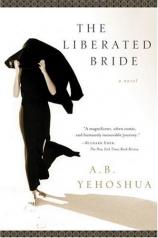Reading Group Guide
Discussion Questions
The Liberated Bride

1. In what way does Samaher's wedding set the tone for the novel? What is the nature of the unions-political, nuptial, or otherwise-considered by Rivlin?
2. Throughout The Liberated Bride, Rivlin and the other characters must cross through numerous geographic borders. What are the parameters for defining homeland in the novel? Who is permitted to receive hospitality? What constitutes a foreigner?
3. Rivlin and his colleagues grapple with age-old conflicts regarding Israel and surrounding regions. How does the scholarly world's approach differ from that of politicians?
4. Discuss the portrayals of Rivlin's mother. What does her ghost signify to him?
5. Compare and contrast Rivlin's two sons. Do they reflect aspects of their father in any way? What was the effect of Ofer's secrecy and his immersion in his father-in-law's business? What are the social implications of his choices?
6. What does Rivlin discover about himself through the ancient Arab stories, translated from a blood-spattered manuscript?
7. Do you believe that Samaher was attempting to convey a message to Rivlin through her work on the project, or was she simply trying to stay motivated? What do you make of her rumored pregnancy?
8. The airport is a frequent destination in the novel. What does this indicate about the novel's setting in general, and Rivlin's role as ambassador and way station?
9. How would you characterize Rivlin's marriage? What techniques do he and his wife use to negotiate their mutual desire to be "right," as well as other issues such as tidiness, time management, and sex? How does Hagit compare to the other female characters in the novel?
10. Discuss the novel's various narratives of faith-including Rivlin's witnessing Ramadan and the fainting nun. What gives him such tolerance and curiosity? How does he characterize his own religious beliefs?
11. What might have prevented Rasheed from being subjected to such violence? Did Rashid place him in the crosshairs of Calamity and Right?
12. The repercussions of French colonization in Algeria form a recurring thread throughout the novel. What parallels can be drawn between this North African history and that of Rivlin's world-the history of Israel as well as Rivlin's own personal story?
13. Does Galya's reappearance at the end of the novel resolve previous questions among Ofer and his family, or does she create new dilemmas for them?
14. Discuss A. B. Yehoshua's storytelling style. What is the effect of his many literary devices, including intermittent use of second person and first person, the inclusion of fables, and an occasional epistolary format? In what way can language and linguistic history deepen our understanding of a people?
15. What can American audiences learn from the novel? What might Rivlin like to teach them, if he were their professor?
16. Consider the author's use of the word liberated in the title. Who in the novel becomes liberated, and from what? Who has the power to truly liberate others, both in the novel and in the world at large?
The Liberated Bride
- Publication Date: October 4, 2004
- Paperback: 576 pages
- Publisher: Mariner Books
- ISBN-10: 0156030160
- ISBN-13: 9780156030168






